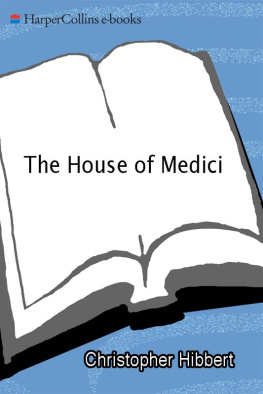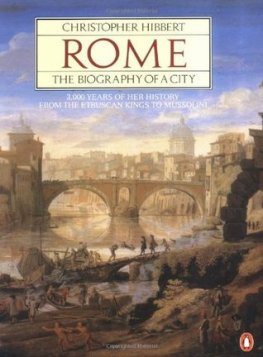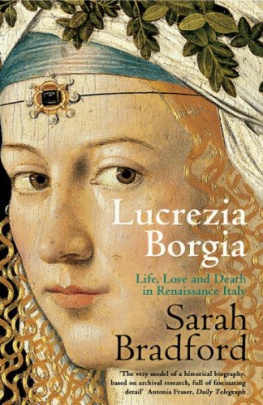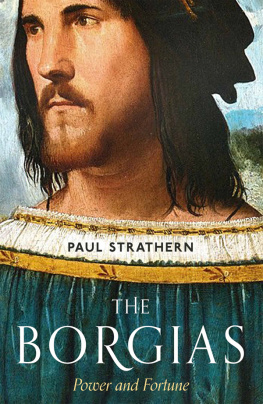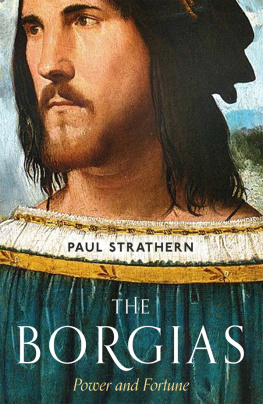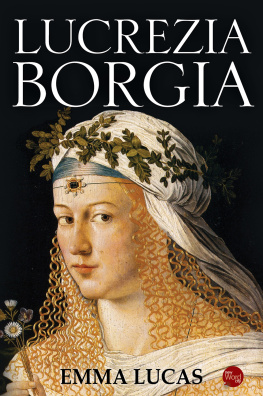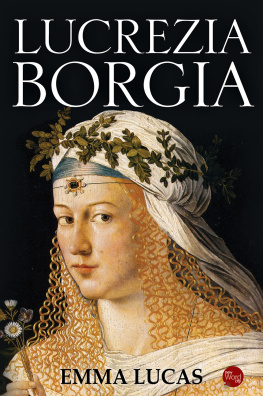A LSO BY C HRISTOPHER H IBBERT
M ILITARY H ISTORY
Wolfe at Quebec
The Destruction of Lord Raglan: A Tragedy of the Crimean War
Corunna
The Battle of Arnhem
Agincourt
Redcoats and Rebels: The War for America, 17701781
Cavaliers and Roundheads: The English at War, 16421649
H ISTORY
King Mob: Lord George Gordon and the Riots of 1780
The Roots of Evil: A Social History of Crime and Punishment
The Court at Windsor: A Domestic History
The Grand Tour
London: The Biography of a City
The Dragon Wakes: China and the West, 17931911
The Rise and Fall of the House of Medici
The Great Mutiny: India, 1857
The French Revolution
Rome: The Biography of a City
The English: A Social History, 10661945
Venice: The Biography of a City
Florence: The Biography of a City
No Ordinary Place: Radley College and the Public School System, 18471997
B IOGRAPHIES
Benito Mussolini: The Rise and Fall of Il Duce
Garibaldi and His Enemies: The Clash of Arms and Personalities in the Making of Italy
The Making of Charles Dickens
Charles I
The Personal History of Samuel Johnson
George IV: Prince of Wales, 17621811
George IV: Regent and King, 18111830
Edward VII: A Portrait
Queen Victoria in Her Letters and Journals
The Virgin Queen: The Personal History of Elizabeth I
Nelson: A Personal History
Wellington: A Personal History
George III: A Personal History
The Marlboroughs: John and Sarah Churchill, 16501744
Queen Victoria: A Personal History
Napoleon: His Wives and Women
Disraeli: The Victorian Dandy Who Became Prime Minister

Constable & Robinson Ltd
3 The Lanchesters
162 Fulham Palace Road
London W6 9ER
www.constablerobinson.com
First published in the USA by Harcourt,
a division of Houghton Mifflin Harcourt Publishing Company, 2008,
as The Borgias and Their Enemies
First published in the UK as The House of Borgia by Constable,
an imprint of Constable & Robinson Ltd, 2009
This edition published by Constable, 2011
Copyright Christopher Hibbert and Mary Hollingsworth, 2008
The right of Christopher Hibbert and Mary Hollingsworth to be identified as the author of this work has been asserted by them in accordance with the Copyright, Designs and Patents Act 1988
All rights reserved. This book is sold subject to the condition that it shall not, by way of trade or otherwise, be lent, re-sold, hired out or otherwise circulated in any form of binding or cover other than that in which it is published and without a similar condition including this condition being imposed on the subsequent purchaser.
A copy of the British Library Cataloguing in
Publication data is available from the British Library
ISBN: 978-1-84901-994-1
eISBN: 978-1-78033-005-1
Printed and bound in the UK
1 3 5 7 9 10 8 6 4 2
C ONTENTS

C HAPTER 1

The Crumbling City
O H G OD , HOW PITIABLE IS R OME
Y OU MUST HAVE heard of this city from others, wrote a visitor to Rome in the middle of the fifteenth century.
There are many splendid palaces, houses, tombs and temples here, and infinite numbers of other edifices, but they are all in ruins. There is much porphyry and marble from ancient buildings but every day these marbles are destroyed in a scandalous fashion by being burned to make lime. And what is modern is poor stuff... The men of today, who call themselves Romans, are very different in bearing and conduct from the ancient inhabitants... They all look like cowherds.
Other visitors wrote of moss-covered statues, of defaced and indecipherable inscriptions, of parts within the walls that look like thick woods or caves where forest animals were wont to breed, of deer and hares being caught in the streets... of the daily sight of heads and limbs of men who had been executed and quartered being nailed to doors, placed in cages or impaled on spears.
This was the state of the city that had once been the capital of a mighty empire; now two-thirds of the area inside the walls, which had been built to protect a population of 800,000, was uninhabited, acres of open countryside used for orchards, pasture, and vineyards, and dotted with ancient ruins, which provided safe hiding places for thieves and bandits. And this was the state of the true home of the pope, the leader of the church who could trace his predecessors back in an unbroken line to St Peter, the apostle entrusted by Christ himself with the care of his flock.
For most of the fourteenth century, even the papacy had abandoned Rome. In 1305, distressed by the unrest and bloody disturbances in the city, the French Pope Clement V (130514) had set up his court in Avignon, in the rambling palace on the east bank of the Rhne, which is known as the Palais des Papes. In Rome there had been constant calls for the papacy to return from its French exile. Most recently these calls had come from an elderly woman, who could be seen almost every day in the crumbling city, sitting by the door of the convent of San Lorenzo, begging for alms for the poor.
She was Birgitta Gudmarsson, the daughter of a rich Swedish judge and widow of a Swedish nobleman, to whom she had been married at the age of thirteen and for whom she had borne eight children. Founder of the Brigittines, she had left Sweden after experiencing a vision in which Christ had appeared before her, commanding her to leave immediately for Rome and to remain there until she had witnessed the popes return. As she went about Rome, from church to crumbling church, house to ruinous house, she claimed to have had further visions; both Jesus and his mother Mary, she said, had spoken to her, and they had strengthened her faith in the restoration of the pope and in the eventual salvation of the city.
Around the house where she lived stretched the charred shells of burned-out buildings, piles of rotting refuse, deserted palaces, derelict churches, stagnant swamps, fortresses abandoned by their rich owners, who had gone to live on their estates in the Campagna, hovels occupied by families on the verge of starvation. Pilgrims took home with them stories of a gloomy city, whose silence was broken only by the howling of dogs and wolves, and the shouts of rampaging mobs.
In Avignon the popes remained deaf to the calls for their return, heedless of the prayers that the saintly Birgitta Gudmarsson uttered so fervently and of the letters that the poet Francesco Petrarch wrote, describing the rubbish heap of history that Rome had become. This once-superb imperial capital was now a lawless ruin, a city torn by violence in which belligerent factions paraded through the streets with daggers and swords, where houses were invaded and looted by armed bands, pilgrims and travellers were robbed, nuns violated in their convents, and long lines of flagellants filed through the gates, barefoot, their heads covered in cowls, claiming board and lodging but offering no money, scourging their naked bloody backs, chanting frightening hymns outside churches, throwing themselves weeping, moaning, bleeding before the altars.
Goats nibbled at the weeds growing up between the stones littering the piazzas and flourishing in the overgrown, rat-infested ruins of the Campo Marzio; cattle grazed by the altars of roofless churches; robbers lurked in the narrow alleys; at night wolves fought with dogs beneath the walls of St Peters and dug up corpses in the nearby Campo Santo. Oh God, how pitiable is Rome, an English visitor lamented, once she was filled with great nobles and palaces, now with huts, wolves and vermin; and the Romans themselves tear each other to pieces.
Next page


